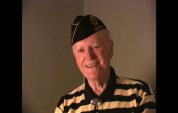5:17 | There were only a couple of dozen Marines holding the position. With the help of a nearby mortar platoon, they held off Banzai charges and approaches from the water side. The next morning, there were hundreds of dead Japanese all around, recalls Braswell Dean, who was soon on the advance again.

His father said that if you join the Army, you'll be cannon fodder and if you join the Navy, you'll be shark bait. Braswell Deen went for the Marines and became both. After boot camp he sailed for the island of Pavuvu where he trained further with his squad leader Joe Daly and his fire team leader Bill Thompson.
Braswell Deen recalls getting ready for the amphibious landing on Peleliu and then the chaos of the landing itself. The shelling had been tremendous, but as on so many other islands, the enemy survived and the Marines faced heavy resistance as they hit the beach.
The fire was heavy from the ridge above, remembers Braswell Deen. His company was pinned down in a tank trap just inland from the beach on Peleliu. He and a couple of other Marines had advanced just past the trap and almost missed the word to fall back. The night that followed was spent in a shell hole with rounds going overhead all night.
A Marine doesn't like to say he retreated, but they didn't have enough men, so the word came to withdraw back toward the beach. Braswell Deen was out ahead of most of the unit. In his book, "Trial By Combat," he credits the medic, Bill Jenkins, with saving his life. Jenkins told the others there were men out there, and under heavy fire, crawled up to pass the word.
After that first day on Peleliu, they were Marines says Braswell Deen. They did what they were trained to do. On the second day, he was once again sent out in advance and narrowly escaped as others were killed. His company suffered 80% killed or wounded, including Fred Fox, who survived an epic bayonet fight.
They were successful on Peleliu, says Marine Braswell Deen, if you can be successful with an 80% casualty rate. He was disturbed to later learn that the airfield that was the objective of the assault turned out to not be needed. At least his exhausted platoon got a much needed break.
Back then they called it psychoneurosis. Men spent from battle would sit and stare off into space according to Braswell Deen, who was lucky to survive Peleliu and preparing for Okinawa. Only one man from his unit, Odell Evans, emerged from those two battles unscathed.
Braswell Deen was relieved when he landed on Okinawa, but that feeling was short lived. The enemy was mostly on the South end of the island and his unit spent the first few weeks cleaning out the North. He was the talker when they were clearing caves, yelling in Japanese for them to come out before the grenades came in.
They took and lost the Okinawan village three times, says Braswell Deen. It was flame thrower tanks that eventually led to the Marines' victory there. As they moved on, he had to leave the man next to him who was shot through the head. It was about this time that an enemy grenade landed in a foxhole and Bill Foster threw himself on it, earning a posthumous Medal of Honor.
The Japanese were dug in on Okinawa, like on so many islands, and the Marines were mounting a furious assault. Charging Wana Ridge with a Thompson submachine gun in his hand, Braswell Deen felt like he was hit with a ton of rocks. It was shrapnel and it knocked him out of the fight. Evacuated to the rear, the brave Marine faced a needle.
Two weeks after his discharge, Marine Braswell Deen entered the University of Georgia law school, and two weeks after he graduated, he was running for office. After decades of public service, he still thinks about those nights on Peleliu.